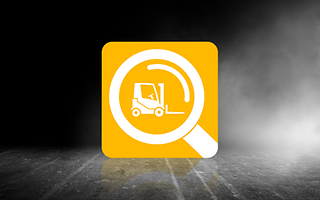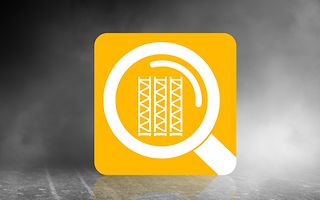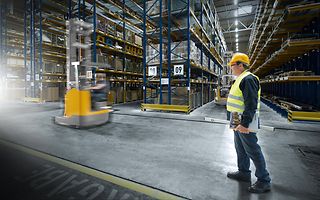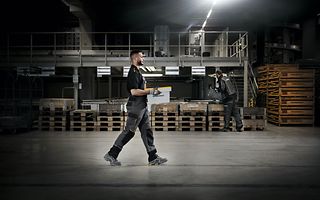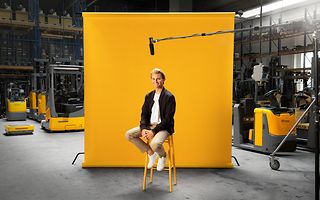Women are severely underrepresented in the UK engineering sector. Historically making up just 11% of the workforce, this has started to change as more and more women take up core STEM (Science, Technology, Engineering and Maths) GCSE subjects.
Jungheinrich UK is dedicated to bolstering this trend by attracting more women into the field of engineering. By opening up career pathways for women through development and apprenticeship programmes across our business, we're keen to promote a different vision for an industry that has traditionally been male-dominated.
To that end, we’re showcasing some of the stories from our female colleagues around the business.
Hannah P. - Site Support Engineer
Biography
I’m 22 years old, from Liverpool and have been working as an apprentice for Jungheinrich since 2015. I have always been interested in figuring out how things work and love learning new things. I have played guitar for 15 years and before starting as an apprentice at Jungheinrich I studied a music engineering course, but I prefer to keep music as a hobby. Outside of work, I enjoy going to kickboxing and other various classes at the gym.
What made you choose a career within the engineering sector?
Tell us about why you picked the role you did, what were your concerns at the time?
I have always had a strong interest in fixing things, taking them apart and putting them back together. When I saw the advert for the apprenticeship with Jungheinrich, it was exactly what I had been looking for. I had no previous experience within the engineering sector before, so was concerned I wouldn’t be qualified enough for the job, but I got the job and haven’t looked back!
What made you overcome barriers to applying?
I thought I should just apply and see what happened as I didn’t have the job anyway so I had nothing to lose. It was definitely the right decision!
What appealed to you the most within the engineering role?
I like taking things to bits and finding out how they work so to be able to do this on a much bigger scale really appealed to me. Jungheinrich has everything I wanted to work on; engines and electrics so it was definitely too good of an opportunity to miss.
Why do you think you chose to maintain this career path so far to date?
When I first started my apprenticeship, I thought it would be a while until I got to do anything, but from the first day I was allowed to work on jobs which was fantastic. I work alongside a mentor who makes each day different and fun but has taught me an unbelievable amount, I couldn’t have asked for anyone better! Seeing myself grow in confidence and skills gives such a high level of satisfaction, and I can’t wait to carry on learning and improving over my career with Jungheinrich.
Within your engineering role, what motivates you?
What really inspires you each day? What makes you leave work knowing you have done a good job?
It is important to me that the customer is happy. In the workshop, big jobs arrive which cannot be carried out by the service team and it’s good to be a part of the team who can do these repairs. Working as part of a successful team of great engineers motivates me, and when the job is finished, it feels good to know the customer is going to have their truck back and running!
What do you enjoy most about your role?
I like that each day is different, I have learnt an unbelievable amount in such a short time.
What can be the challenges of your role?
Sometimes it can be a rush to meet the repair times to ensure the trucks make their transport to the customer.
How do you overcome them?
Work as hard as possible! There is always a way to fix a problem.
What could you say about your career and role that would inspire any women thinking of a role in engineering?
Definitely go for it! More women are definitely getting into engineering now and I think it’s great. If engineering is what you want to do then nothing should stop you.
What are your aspirations for the future?
I can’t wait to be a qualified engineer with Jungheinrich. I would love to one day work abroad with Jungheinrich and eventually go into training so I can give the next generation of engineers the fantastic start that I had!
Hannah B. - Site Engineer
Biography
After finishing my GCSE’s I studied public services at Warwickshire College but soon realised that this was not inspiring me enough. Out of work I was a keen motorcycle racer and always knew the importance of having a reliable Bike to help me be successful. Whilst working on my bike with my father I learned a lot but knew there was so much more and consequently I decided that engineering and maintenance was a field I wished to pursue.
After 12 months completing a foundation mechanical engineering apprenticeship with Caterpillar I successfully applied for an Apprenticeship with Jungheinrich.
When I applied for Jungheinrich it was clear that if I was successful in the interview I would be their first female engineer. This made me more determined to succeed in the interview and be able to prove that women can do it too.
From the outset I was placed in a large distribution warehouse working with a great team who allowed me to grow into the role and taught me everything that I needed to know to support my ambition of becoming a field service engineer – it’s surprising how much I learned so quickly.
I traveled for my Studies between Bristol and most recently North Warwickshire & Hinckley College and successfully passed all my exams in 2016 where I then started a role within the field service team.
What made you choose a career within the engineering sector?
Tell us about why you picked the role you did, what were your concerns at the time?
I wanted a variety in the work I did and was worried that working with forklifts would not allow me that – I was wrong as the variety in electrical and mechanical challenges is huge
What made you overcome barriers to applying?
Jungheinrich are a strong organisation with a worldwide brand image that promotes quality and provides good training to deal with its diverse range of products.
What appealed to you the most within the engineering role?
To be able to investigate and fix problems and understand how things work in more detail. Being hands on was the way forward for myself.
Why do you think you chose to maintain this career path so far to date?
The challenges and variety of the daily work keep me motivated
Within your engineering role, what motivates you?
What really inspires you each day? What makes you leave work knowing you have done a good job?
Turning up to service trucks and keep customers on track is good but to be able to resolve a problem and get customers up and running again is a real achievement.
Why do you feel more women should choose a career within engineering roles?
What do you enjoy most about your role?
I like the fact that there is always something different to do. You learn new things every day and it is always a learning curve within the engineering role.
What can be the challenges of your role?
Every job has its own challenges but I find that within my job role it is making sure trucks are functional so the operation can keep going.
How do you overcome them?
Keep calm and believe in yourself. Always be honest to yourself and the customer with what is happening.
What could you say about your career and role that would inspire any women thinking of a role in engineering?
It is a good career within engineering. Things are always developing and you are always learning. I’d say to most women that are undecided on a career path to give it ago and with an apprenticeship you are earning whilst learning. There are lots of roles within engineering you can do from Mechanical, civil, electrical and more.
What are your aspirations for the future?
After completing my apprenticeship, I have been working as a field service engineer which now inspires me get other women involved in engineering.
Following on from my role as a field service engineer I aspire to work myself up to a manager within the engineering sector.
A Day in the Life: Pamela E. & Frances T.
Here we meet two FLT engineers, Pamela Eaves (PE) and Frances Tebbutt (FT) and explore their routes into engineering, the most challenging aspects of their work with Jungheinrich UK, and their advice for other women thinking of an engineering career.
Tell us about your role
PE: My job entails maintenance on the trucks - preventative maintenance and breakdown. I work on the tools.
I start at half past seven. I see what my dispatchers put on the job list and I basically go to whichever site I'm sent. I could be on a site where I've got several services booked, maybe get called to a couple of breakdowns, or I can be driving around pretty much all day checking on our customers’ trucks.
FT: I carry out full maintenance on the trucks. That could be preventative maintenance, like servicing and generally looking after the FLTs, cleaning, tidying and repairs. I also fix them when things go wrong. Every truck has a service schedule which generally lowers the amount of breakdowns.
How did you become an FLT engineer?
FT: I did my apprenticeship with Jungheinrich UK actually. Before doing it, I used to work in a warehouse driving the trucks, but I wanted more. My dad's a mechanic and I wanted to be more hands on and have a career with development.
The warehouse I used to work at had Jungheinrich trucks. I was talking to the engineer who used to service them and suggested I’d like to go into that side of things. About six months later he said, “If you're still interested there's apprenticeships available.”
I did that almost six years ago. It was a three-year apprenticeship, and I’ve now got a level 3 NVQ.
PE: I just like mechanical things. I like seeing how things work, it interests me. I was previously a PSV mechanic, which is a bus mechanic and I wanted to progress more. I did an apprenticeship with a bus company and have an NVQ level 3 in mechanical engineering.
I’ve been in the job a year, and it’s taken a little bit of adjustment. For example, it's absolute bliss when you've got a workshop and you've got everything to hand and you've got easy access to look at the problems. This tends not to be the case with FLTs. It’s a bit different – but it’s a great job… and they don't all weigh 12 tonnes!
What skills are most important in your role?
PE: You need to have a logical mindset. And you need to be able to see how things work.
You need dedication as well, because winters are horrible… oh yeah, you need good thermal underwear too!
FT: You need to be able to work as a team and individually too. I suppose you must have to be pretty resourceful, as you don’t know what you’re going to be called out to - that’s all about experience. Once you've been doing it a little while, you just generally know what’s needed. For example, I go to one site quite often and I know the trucks so well I even remember their serial numbers. It’s like a superpower!
You’re the face of the company to your customers. I ended up servicing the trucks in the warehouse where I used to drive them. It was strange going back into the same workplace with a totally different role.
I still go there regularly and I've got a really good working relationship with all the managers there. They’ve known me for ten years and have seen me grow.
What is the most challenging aspect of your work?
FT: You just don't really know what to expect – but that’s the good side too.
PE: I think for me, what's challenging is I never trained to be a forklift engineer; I trained to be a bus mechanic. So going from that kind of environment into this environment was a lot to get your head round and there were lots of different ways of working. For example, if a bus needed a new brake calliper, you just fixed it. Here we need to check the service contract and get the paperwork signed off.
What are your proudest achievements?
FT: Completing my apprenticeship and then every day getting better and improving. I used to really struggle with confidence, and now I'm getting more confident and tackling harder jobs.
What do you enjoy the most about your job?
FT: The support from my colleagues.
PE: I'm really enjoying the team leader aspect of the job. I enjoy looking after my team.
I do a lot of the paperwork side of things and I like to check in with them. I can phone them up randomly and be that listening ear for them. To be honest, being an engineer can be a lonely job, because you can be out and about and not see anyone. It’s just you. So as well as being resourceful, it’s good to have your team to call on. And we have each other to ask about, say, a particular fault code, or how to figure something out.
When I first started, I was like a rabbit in the headlights. My team were amazing – they stopped what they were doing to share their knowledge until I figured it all out. Without them, I don't think I’d still be in the job.
What one thing about your role would others find most surprising?
PE: Probably that there’s a women rocking up as an engineer!
What did you find most surprising about the role?
FT: That’s a hard one, because I’ve seen my dad fixing cars most of my life. He’s a mechanic, so I wasn’t surprised about that side of things – but I WAS surprised by the range of trucks. I’d only ever seen reach trucks and counterbalances, but I had no idea the rest of them existed. My learning curve was massive!
What do you do in your spare time?
PE: I enjoy playing on the PlayStation and messing around with my Evo eight, which is a rally car. I’m not taking part in any track competitions as I'm too scared to wreck it. I had it as my wedding car.
FT: I like going out on my motorbike. And me and my dad fix them together.
How can we encourage a more diverse workforce?
PE: When I was doing my engineering apprenticeship, I was thinking of working with cars, lorries, buses, even trains. But not once did I think about forklifts. So I’d say to people, think about forklifts. It’s a great sector and I hope to be here a long time.
What would you say to others like yourself, who are looking for a career?
PE: Don't be put off by it being a male dominated environment. My team are all easy-going blokes. I think a lot of it depends on how you deal with people, isn't it?
You’re never fully equipped to deal with some situations, and sometimes you’ve got to be thick-skinned. But isn’t that the case in all jobs?
FT: I’d say, just go for it. Don't be scared - you can always learn. Just because you can't do it now, doesn't mean that you won’t be able to do it in the future.
Strength was a big thing for me at the beginning. It's very physical. I've got a lot stronger in the five years or so that I've been doing it, but for lots of situations you just need to find ways of doing things differently. If you can't quite lift a wheel on, get a lever bar and lever it up.
You just need resourcefulness.
Give it a go. At Jungheinrich, there’s no prejudice. Gender doesn’t matter. They just want good people who can do the job.
